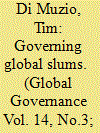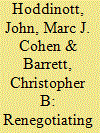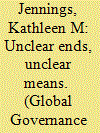| Srl | Item |
| 1 |
ID:
083824


|
|
|
|
|
| Publication |
2008.
|
| Summary/Abstract |
Recent literature has focused on the ways in which civil society organizations are contributing to practices of global governance in an era of neoliberalism. As UN Habitat has pointed out, what has also coincided with the shift to neoliberalism is the proliferation and growth of global slums. As slums have become an increasingly widespread form of human settlement, a global campaign to improve the life of slum dwellers has emerged under the Millennium Development Goals. In this article, I argue that this project can be conceived of as a biopolitical campaign where nongovernmental and community-based organizations are viewed as a kind of panacea for the problem of slums. This view is misguided given the scale of the problem and the apartheid of life chances that has accompanied neoliberalism.
|
|
|
|
|
|
|
|
|
|
|
|
|
|
|
|
| 2 |
ID:
083823


|
|
|
|
|
| Publication |
2008.
|
| Summary/Abstract |
The current global agreement governing food aid-the Food Aid Convention (FAC)-has been subject to annual renewals since it expired in 2002. Critics have pointed to some serious limitations, but negotiations over a new FAC have become entangled in US-European agricultural trade disputes. Other issues in renegotiation include the patchwork quilt of food aid governance, in which the FAC's mandate overlaps with those of several other institutions; inadequate transparency; the nature of commitments-whether to express them in tonnage, value, or nutritional terms; the level of commitments and their distribution among donors; monitoring and enforcement of commitments; stakeholder representation on the FAC governing body; and the convention's institutional "home." Also problematic is whether the FAC should have an "instrument focus"-food aid-or a "problem focus," such as "food security."
|
|
|
|
|
|
|
|
|
|
|
|
|
|
|
|
| 3 |
ID:
083826


|
|
|
|
|
| Publication |
2008.
|
| Summary/Abstract |
Natural disasters such as the 2004 tsunami, hurricane Katrina in 2005, and the 2006 South Asian earthquake; the postwar sites of Afghanistan and Iraq; and housing regeneration programs in the UK have allowed international institutions to increasingly gain legitimacy to participate in postdisaster governance through the language of human rights. The World Conference on Disaster Reduction (2005) promoted "people-centered governance" to reduce the violation of human rights of the poor and excluded, indicating the important relationship of rights and governance. In this article, I draw on the empirical research I conducted while living and working in villages as a relief and community development worker in the postearthquake reconstruction processes in Maharashtra India, during 1993-1997. I consider how rights legitimize, materially determine, and physically locate sites of governance in the postearthquake Maharashtra reconstruction process. I suggest that this formula of people-centered governance for understanding the relations of rights and governance is applicable to wider reconstruction processes, from postdisaster to everyday life
|
|
|
|
|
|
|
|
|
|
|
|
|
|
|
|
| 4 |
ID:
083827


|
|
|
|
|
| Publication |
2008.
|
| Summary/Abstract |
From Sierra Leone to Solomon Islands, developed powers have undertaken a range of state-building interventions in the early years of this century. Two influences appear to shape the emerging state of the art on state building: conceptions about the nature of the state in the developed world; and the postcolonial sensitivities and practicalities that attend the project of intervention. After examining the imperatives driving interventions in fragile states, I explore the remarkable consistency among approaches to state building applied by different states and coalitions in different contexts. I then examine the imperatives driving this convergence of approaches and conclude with some observations tracing the difficulties of contemporary interventions to the current dominant approach to state building
|
|
|
|
|
|
|
|
|
|
|
|
|
|
|
|
| 5 |
ID:
083825


|
|
|